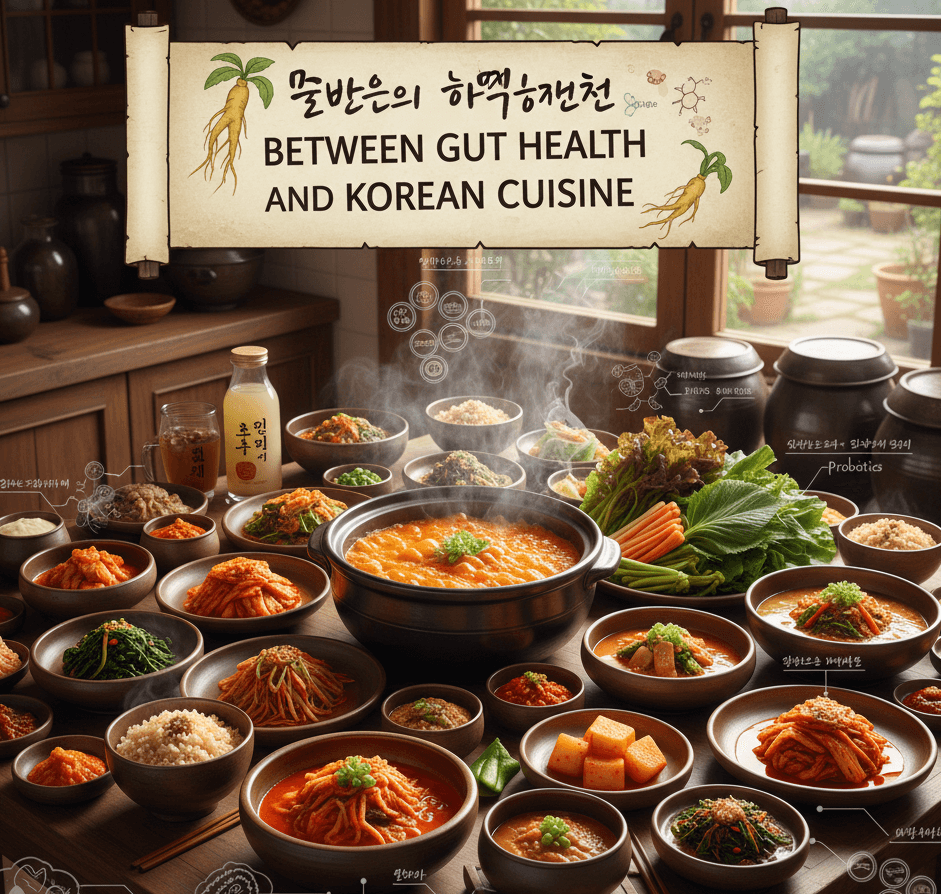Korean cuisine is celebrated not only for its bold flavors and colorful dishes but also for its remarkable health benefits—especially its impact on gut health. Across the world, scientists and nutritionists are recognizing that a healthy gut is central to strong immunity, balanced mood, and overall vitality. Interestingly, the traditional Korean diet has been supporting gut wellness for centuries through fermented foods, balanced meals, and natural ingredients.
➤ Fermentation: The Heart of Korean Gut Health
Fermentation is one of the oldest and most defining features of Korean cuisine. From kimchi and doenjang (soybean paste) to gochujang (red chili paste) and ganjang (soy sauce), fermentation is more than a preservation method—it’s a source of living nutrition.
During fermentation, beneficial bacteria such as Lactobacillus develop naturally. These probiotics are known to:
- ➤ Balance gut flora, increasing the population of “good” bacteria.
- ➤ Improve digestion by breaking down nutrients into more absorbable forms.
- ➤ Enhance immunity by strengthening the intestinal barrier.
- ➤ Reduce inflammation and even help regulate metabolism.
Korean kimchi is especially rich in lactic acid bacteria, vitamins, and antioxidants. Studies have shown that regular kimchi consumption can improve gut microbiota diversity and support weight control while lowering cholesterol levels.
➤ Kimchi: Korea’s Superfood for the Microbiome
Kimchi is not just a side dish—it’s a gut-healing powerhouse. Made from napa cabbage, radishes, garlic, ginger, red pepper flakes, and sea salt, it ferments naturally for days or even months.
How kimchi helps the gut:
- ➤ The probiotics produced during fermentation aid in breaking down carbohydrates and fiber, making digestion easier.
- ➤ The garlic and ginger used in kimchi have antimicrobial properties, keeping harmful bacteria in check.
- ➤ Capsaicin from red chili promotes metabolism and circulation, indirectly benefiting digestive efficiency.
Eating small portions of kimchi regularly contributes to a balanced microbiome—the community of bacteria in your intestines that affects everything from immunity to mental health.
➤ Doenjang and Gochujang: Fermented Flavor with Function
Beyond kimchi, other fermented condiments in Korean cuisine also support gut wellness.
- Doenjang (soybean paste): Fermented soybeans provide amino acids, peptides, and probiotics that enhance digestive enzyme activity and help detoxify the intestines. Its rich umami flavor adds depth to soups and stews while supplying beneficial compounds for the gut.
- Gochujang (fermented chili paste): Combines chili, glutinous rice, and fermented soy, offering both fiber and beneficial microorganisms. It helps maintain healthy gut movement and contributes to nutrient balance.
- Cheonggukjang (fast-fermented soybean): Known for its strong aroma, this powerful probiotic food contains Bacillus subtilis, which improves intestinal health, reduces constipation, and enhances immunity.
Together, these condiments create not just taste, but digestive harmony in the Korean diet.
➤ Fiber and Vegetables: Feeding the Gut Microbes
Korean meals are naturally rich in vegetables and plant-based fiber, which serve as prebiotics—food for healthy gut bacteria.
Common dishes include:
- Namul (seasoned vegetables): spinach, bean sprouts, bracken, and bellflower roots, all packed with fiber and phytonutrients.
- Bibimbap: a bowl of rice topped with assorted vegetables, egg, and gochujang, providing both probiotics (from the sauce) and prebiotics (from the vegetables).
- Seaweed soups: supply minerals and soluble fiber that support bowel health and balance sodium in the body.
Fiber supports gut motility, while plant-based antioxidants help reduce inflammation and oxidative stress in the digestive tract.
➤ Rice and Whole Grains: The Digestive Base
Rice is the foundation of most Korean meals, but it’s often paired with barley, millet, or black rice, creating a balanced source of complex carbohydrates and fiber.
These grains feed beneficial bacteria and promote steady energy release. Brown rice, for example, contains resistant starch, which acts as a natural prebiotic that fosters healthy microbial growth. When consumed alongside fermented dishes, it creates a perfect synergy for digestive wellness.
➤ Soup Culture: Warm, Hydrating, and Soothing
In Korea, no meal feels complete without soup. Hot soups and stews—like doenjang jjigae (soybean paste stew), kimchi jjigae (kimchi stew), or miyeokguk (seaweed soup)—support digestion by keeping the stomach warm and hydrated.
These dishes combine fiber, protein, and fermented bases that encourage healthy enzyme function and absorption. The warm temperature of the food helps maintain digestive energy, which Korean nutritionists believe is essential for gut balance.
➤ Moderation and Meal Balance
Korean eating habits also contribute to gut health through balance and portion control. Meals are typically eaten in moderation and include a variety of side dishes rather than one large main course. This ensures a diversity of nutrients that feed different types of beneficial gut bacteria.
The culture of slow eating and appreciating food with family encourages mindful digestion, reducing stress—a known disruptor of gut function.
➤ Herbal and Fermented Drinks for Digestive Support
In addition to solid food, Korea’s beverage traditions promote gut cleansing and relaxation:
- Barley tea (boricha): Helps with digestion, reduces bloating, and supports kidney detoxification.
- Omija tea (five-flavor berry): Balances the liver and improves gut function through antioxidants.
- Fermented rice drinks like sikhye contain enzymes that aid in breaking down starches after meals.
These drinks reflect the Korean principle of healing through everyday nourishment rather than medicine.
➤ Scientific Insights: Korean Diet and Microbiome Diversity
Recent studies confirm that traditional Korean diets increase microbial diversity in the gut—a key marker of health. People who eat fermented Korean foods regularly tend to have higher levels of beneficial bacteria such as Lactobacillus plantarum and Bifidobacterium, which protect the gut lining and reduce inflammation.
Researchers also found that Korean diets rich in fiber and fermented foods may help lower risks of obesity, diabetes, and digestive disorders by improving metabolic function and insulin sensitivity.
➤ Conclusion
Korean cuisine is a living example of how food can be both delicious and therapeutic. Its foundation in fermentation, fiber, and balance supports gut health naturally, long before “probiotics” became a global buzzword.
By eating the Korean way—warm meals, diverse vegetables, whole grains, and plenty of fermented side dishes—you can strengthen your digestion, boost immunity, and enhance overall well-being. The science behind gut health confirms what Korean tradition has practiced for generations: when your gut is healthy, your whole body thrives.












